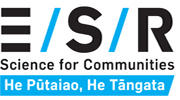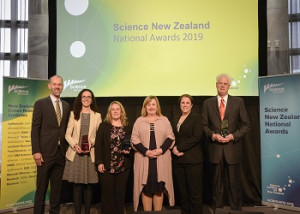ESR Scientists were among the winners at the annual Science New Zealand National Awards, presented at Parliament on Monday evening, 11 November 2019. The awards recognise the contribution of the scientists working at the seven Crown Research Institutes. ESR is the crown research institute,
Dr Rob Lake was awarded the Lifetime Contribution to Science Award for his body of work in the foodborne illness area. Environmental Scientist Dr Maria Gutierrez-Gines won the Early Career Research Award for her work on Manuka for the Centre for Integrated Biowaste Research, and the Team Award went to the award winning STRmix Team who have developed ground-breaking forensic software that helps solve more crime.
Keith McLea, ESR Chief Executive and Chair of Science New Zealand, said the awards recognised the outstanding science being done in New Zealand and the exceptional people contributing their expertise, insights and dedication to make a real impact for New Zealand.
“The work our ESR scientists do, makes a real impact to the safety, health and wellbeing of New Zealanders. These awards demonstrate the high calibre and commitment of our scientists.”

Lifetime Contribution to Science Award
Dr Rob Lake has been honoured for his 30-year contribution to the field of food safety.
His Lifetime Achievement Award recognises the impact his work has had on enhancing the well-being of New Zealand consumers and protecting this country’s access to international markets.
Dr Lake’s achievements include publishing over 60 papers and has held leadership roles for two of the largest foodborne illness epidemiology studies in New Zealand. He and his colleagues at ESR developed burden estimates for foodborne diseases, which help to prioritise efforts by New Zealand food safety regulatory authorities.
Within ESR, Rob has held several leadership positions and is known for mentoring younger staff. Rob also leads ESR’s participation in the New Zealand Food Safety Science and Research Centre.
Collaboration with international scientists led to him being invited to join the World Health Organization project to estimate the global burden of foodborne disease. These results were published in 2015.
Dr Lake said that being able to contribute towards the public good by reducing foodborne disease was an important motivation for him.
Early Career Researcher Award
Dr Maria Gutierrez-Gines has been busy establishing herself as a significant emerging researcher in the field of environmental science.
 Her Early Career Researcher Award recognises her work in phytoremediation, plant-soil interactions between plant root systems, and the re-use of bio-waste for growing economically important native plants.
Her Early Career Researcher Award recognises her work in phytoremediation, plant-soil interactions between plant root systems, and the re-use of bio-waste for growing economically important native plants.
Dr Gutierrez-Gines passion is for plants. “We can use them to solve water quality, farm runoff, biowaste issues and a variety of other things.”
She is renowned for her ability to engage with and meet the needs of stakeholders, with projects involving the safe reuse of biowaste and using Mānuka in riparian plantings as a much more effective way to reduce farm runoff.
She also currently leads the Centre for Integrated Biowaste Research which is a multidisciplinary collaboration that provides solutions to the sustainable management of biowaste.
Dr Gutierrez-Gines has published 14 scientific papers,one full book and 17 independent book chapters, and presented at 30 conferences.
Team Award
The multi-award winning STRmix team developed ground-breaking forensic software that helps solve crimes once deemed unsolvable.
 They have been honoured for working together to develop this crucial tool for DNA Interpretation.
They have been honoured for working together to develop this crucial tool for DNA Interpretation.
The Team Award recognises the innovative work they put into developing the world’s most advanced DNA profiling software.
The programme works by unravelling the DNA from multiple individuals recovered from a crime scene and uses biological modelling and probabilistic methods to achieve results not possible with traditional DNA interpretation methods. A comprehensive training and support package is built around the software.
Dr Jo-Anne Bright, ESR Senior Science Leader and one of the original developers says she is proud of the STRmix team’s success.
“It means so much to us that our work is helping solve crime throughout the world. Since STRmix™ was made available, its results have been reported in over 120,000 criminal cases and has had evidence presented in 3600 court cases globally.”
Dr Bright said that within New Zealand, it has resulted in a two-fold increase in the number of unsolved crime samples that can be searched against the national DNA database of known individuals.
The STRmix™ team has grown from four to sixteen people over the last seven years, and they are active in the scientific community, having published ten peer-reviewed papers in the 2018/2019 financial year alone.
ENDS
For more information, please contact:
0800 ESR MEDIA (0800 377 633) or media@esr.cri.nz

